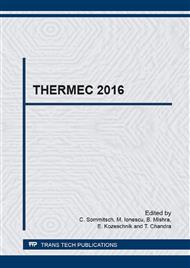p.1043
p.1049
p.1053
p.1057
p.1063
p.1068
p.1074
p.1080
p.1086
Mechanical Properties of Polymer-Based Hybrid Films: Tailoring the Hybrid Interface Using Soft Chemistry
Abstract:
Soft chemistry (chimie douce) processes allow the design of multifunctional composite coatings tailoring the interfaces between phases. Instrumented indentation has become routinely used to characterize thin systems and allows for getting insight into interface mechanics. The paper illustrates both experimental approaches allowing for the fabrication PMMA based nanocomposites and their characterization employing nanoindentation.
Info:
Periodical:
Pages:
1063-1067
DOI:
Citation:
Online since:
November 2016
Authors:
Price:
Сopyright:
© 2017 Trans Tech Publications Ltd. All Rights Reserved
Share:
Citation:


